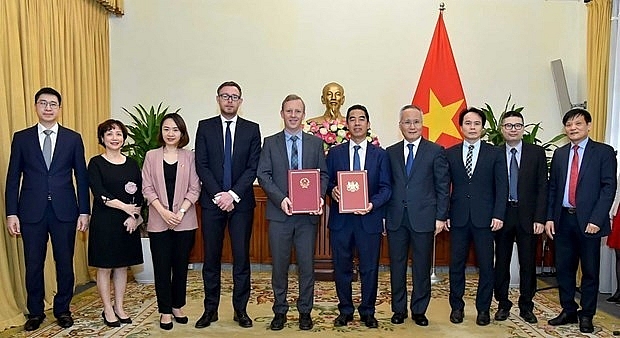Healthcare focus for Brit investors through UVFTA
 |
| Representatives of Vietnam and the UK hand over notes confirming the date when the UKVFTA comes into force. Photo: VNA |
Emily Hamblin, UK consul general in Ho Chi Minh City and trade director for Vietnam, said that May 1 is the next milestone to celebrate in the United Kingdom and Vietnam’s timeline of implementing the free trade deal (UVFTA), when the agreement will legally enter into force.
However, the benefits of it have already been in place for several months, being provisionally applied from January 1. Some 65 per cent of all tariffs have already been eliminated and this will increase to 99 per cent over the next six years. This equates to tariff savings of $134.65 million per year on Vietnamese exports to the UK by full implementation, and of $42.52 million per year on UK exports to Vietnam.
Among them, there are huge cooperation opportunities in the field of healthcare. Hamblin said that in an age of growing challenges from non-communicable diseases, and emerging threats from infectious diseases such as COVID-19, digital health has the potential to offer new solutions and alleviate pressure on overstretched health systems. Digital health technology can empower patients to actively participate in their care, improve clinical outcomes, and enhance operational efficiency.
Innovation and technology have touched many aspects of life in Vietnam and healthcare is no exception. In a concerted effort to embrace Industry 4.0, the Vietnamese government has committed to a national agenda that seeks to harness the potential of digital solutions across the healthcare system. This has set a solid foundation for digital transformation in Vietnam, and the UK shares many of the same aspirations.
“We seek to utilise digital innovation to expand equitable access to quality care, in line with United Nations Sustainable Development Goal 3 on good health and wellbeing. At the early stage of digital transformation, Vietnam has plenty of opportunities to avail of innovative solutions from the UK,” Hamblin stressed.
Meanwhile, Nitin Kapoor, chairman and general director of AstraZeneca Vietnam, said, “As AstraZeneca continually strives to put patients first, we appreciate the UVFTA that is helping to ensure continued access to our innovative and high-quality medicines for millions of Vietnamese patients.
British pharmaceuticals like AstraZeneca can enjoy the increased protection and enforcement of intellectual property rights, internationalised standards and technical regulations, and enhanced transparency of policies on government procurement and reimbursement, which in turn will allow us to better serve local patients.”
Kapoor stressed that the UVFTA entering into force is especially meaningful when the UK and Vietnam are looking forward to another decade of bilateral strategic partnership, cooperating ever more closely in numerous areas, including healthcare, to strengthen the livelihoods and economic prosperity of the people.
Indeed, a number of UK healthcare investors have started to set up their presence in Vietnam. Last year London-based Real Capital London launched a $156 million Hong Anh Medical Campus project in Ho Chi Minh City. The facility will be a state-of-the-art healthcare system incorporating a 462-bed hospital, a medical training centre, a network of general practice clinics and pharmacies, and senior residencies and nursing homes, adding much needed facilities and services to Vietnam’s healthcare system.
The project is divided into four stages, with the final phase expected to be completed by 2030. The fund’s vision is to build a state-of-the-art medical campus under British standards, offering the highest standards of healthcare in Vietnam
As of present, British investors have poured $3.87 billion across over 400 projects in Vietnam and is the 15th-largest foreign investor in the country. Established British actors already here include financial services companies like HSBC, Standard Chartered Bank, and Prudential; Jardines in real estate; and healthcare companies such as AstraZeneca, GSK, and Reckitt.
In the past decade, Vietnam and the UK already enjoyed a strong growth cycle – with bilateral trade growing on average 12 per cent per year. The UVFTA is built upon that strong basis and is opening the doors to increase capital flow between the two nations, according to Hamblin.
She stressed that the UVFTA provides better market access for services, as Vietnam has committed to opening up markets beyond that set out within the World Trade Organization’s baseline, which delivers greater market access for UK service providers. These and other measures set out in the FTA represent real benefits for both businesses and consumers.
In the same vein, Kenneth Atkinson, executive chairman of Grant Thornton Vietnam and a board member of Britcham Vietnam, said that the UVFTA is one of the first signed and entered into by the UK, after leaving the European Union last year. The agreement reflects the importance both the UK and Vietnamese government place on the strategic partnership and the growing importance of the bilateral relationship.
Atkinson expected that a reduction in regulatory barriers and red tape will attract UK investors to Vietnam, particularly in the healthcare space.
What the stars mean:
★ Poor ★ ★ Promising ★★★ Good ★★★★ Very good ★★★★★ Exceptional
Related Contents
Latest News
More News
- Hermes joins Long Thanh cargo terminal development (February 04, 2026 | 15:59)
- SCG enhances production and distribution in Vietnam (February 04, 2026 | 08:00)
- UNIVACCO strengthens Asia expansion with Vietnam facility (February 03, 2026 | 08:00)
- Cai Mep Ha Port project wins approval with $1.95bn investment (February 02, 2026 | 16:17)
- Repositioning Vietnam in Asia’s manufacturing race (February 02, 2026 | 16:00)
- Manufacturing growth remains solid in early 2026 (February 02, 2026 | 15:28)
- Navigating venture capital trends across the continent (February 02, 2026 | 14:00)
- Motivations to achieve high growth (February 02, 2026 | 11:00)
- Capacity and regulations among British areas of expertise in IFCs (February 02, 2026 | 09:09)
- Transition underway in German investment across Vietnam (February 02, 2026 | 08:00)

 Tag:
Tag:




















 Mobile Version
Mobile Version